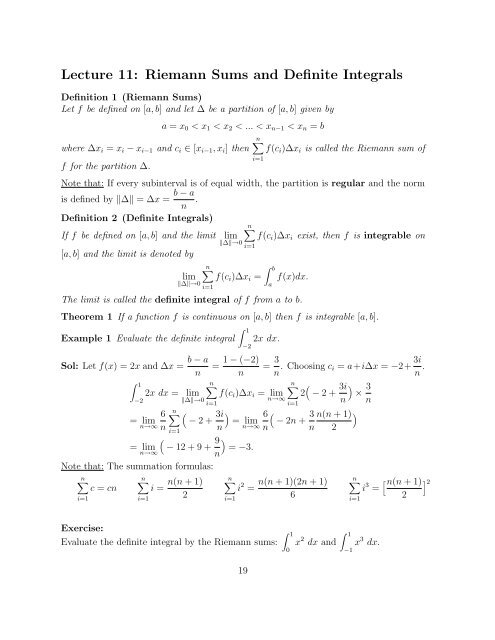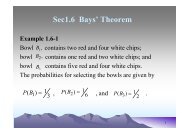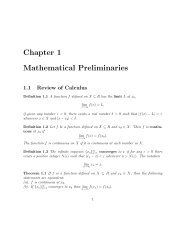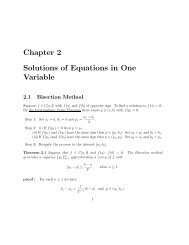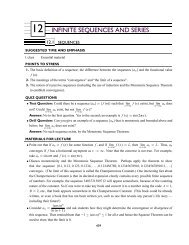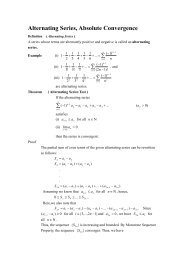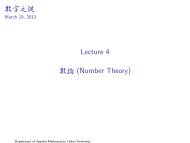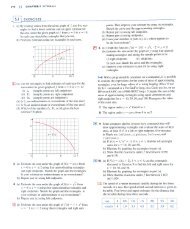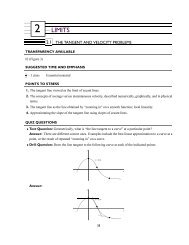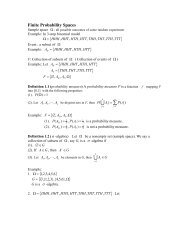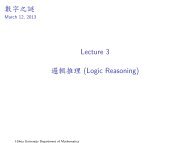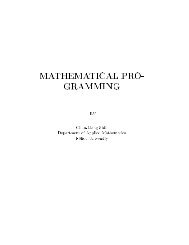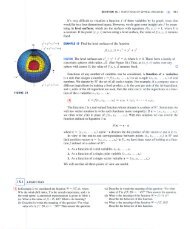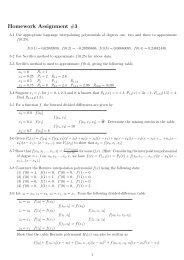Lecture 11: Riemann Sums and Definite Integrals
Lecture 11: Riemann Sums and Definite Integrals
Lecture 11: Riemann Sums and Definite Integrals
Create successful ePaper yourself
Turn your PDF publications into a flip-book with our unique Google optimized e-Paper software.
<strong>Lecture</strong> <strong>11</strong>: <strong>Riemann</strong> <strong>Sums</strong> <strong>and</strong> <strong>Definite</strong> <strong>Integrals</strong><br />
Definition 1 (<strong>Riemann</strong> <strong>Sums</strong>)<br />
Let f be defined on [a,b] <strong>and</strong> let ∆ be a partition of [a,b] given by<br />
a = x 0 < x 1 < x 2 < ... < x n−1 < x n = b<br />
n∑<br />
where ∆x i = x i − x i−1 <strong>and</strong> c i ∈ [x i−1 ,x i ] then f(c i )∆x i is called the <strong>Riemann</strong> sum of<br />
f for the partition ∆.<br />
Note that: If every subinterval is of equal width, the partition is regular <strong>and</strong> the norm<br />
is defined by ‖∆‖ = ∆x = b − a<br />
n .<br />
Definition 2 (<strong>Definite</strong> <strong>Integrals</strong>)<br />
n∑<br />
If f be defined on [a,b] <strong>and</strong> the limit lim f(c i )∆x i exist, then f is integrable on<br />
‖∆‖→0<br />
i=1<br />
[a,b] <strong>and</strong> the limit is denoted by<br />
n∑<br />
∫ b<br />
lim f(c i )∆x i = f(x)dx.<br />
‖∆‖→0<br />
i=1<br />
a<br />
The limit is called the definite integral of f from a to b.<br />
Theorem 1 If a function f is continuous on [a,b] then f is integrable [a,b].<br />
Example 1 Evaluate the definite integral<br />
∫ 1<br />
−2<br />
i=1<br />
2x dx.<br />
Sol: Let f(x) = 2x <strong>and</strong> ∆x = b − a<br />
n<br />
= 1 − (−2)<br />
n<br />
∫ 1<br />
n∑<br />
2x dx = lim f(c i )∆x i = lim<br />
−2<br />
‖∆‖→0<br />
i=1<br />
n∑<br />
6 ( 3i<br />
= n→∞<br />
lim − 2 +<br />
n<br />
i=1<br />
n<br />
( 9 )<br />
= n→∞<br />
lim − 12 + 9 + = −3.<br />
n<br />
Note that: The summation formulas:<br />
n∑<br />
n∑ n(n + 1)<br />
n∑<br />
c = cn i = i 2 =<br />
2<br />
i=1<br />
i=1<br />
) 6 = n→∞ lim<br />
n<br />
i=1<br />
= 3 n . Choosing c i = a+i∆x = −2+ 3i<br />
n .<br />
n ∑<br />
n→∞<br />
i=1<br />
(<br />
− 2n +<br />
3<br />
n<br />
n(n + 1)(2n + 1)<br />
6<br />
2 ( − 2 + 3i ) 3 ×<br />
n n<br />
n(n + 1) )<br />
2<br />
n∑<br />
i=1<br />
i 3 = [ n(n + 1) ] 2<br />
2<br />
Exercise:<br />
Evaluate the definite integral by the <strong>Riemann</strong> sums:<br />
19<br />
∫ 1<br />
0<br />
x 2 dx <strong>and</strong><br />
∫ 1<br />
−1<br />
x 3 dx.
Theorem 2 If f is integrable [a,b] <strong>and</strong> c ∈ [a,b], then<br />
†<br />
∫ a<br />
a<br />
f(x)dx = 0 †<br />
∫ b<br />
a<br />
∫ a ∫ b ∫ c ∫ b<br />
f(x)dx = − f(x)dx † f(x)dx = f(x)dx+ f(x)dx<br />
b<br />
a<br />
a<br />
c<br />
Theorem 3 If f <strong>and</strong> g are integrable [a,b] <strong>and</strong> k is a constant then the function of kf<br />
<strong>and</strong> f ± g are integrable on [a,b]<br />
†<br />
∫ b<br />
a<br />
∫ b<br />
kf(x)dx = k f(x)dx ‡<br />
a<br />
∫ b<br />
a<br />
[ ] ∫ b<br />
f(x) ± g(x) dx = f(x)dx ±<br />
Theorem 4 † If f is integrable <strong>and</strong> f(x) ≥ 0 on [a,b] then<br />
‡ If f <strong>and</strong> g are integrable <strong>and</strong> f(x) ≤ g(x) on [a,b] then<br />
a<br />
∫ b<br />
a<br />
∫ b<br />
a<br />
∫ b<br />
a<br />
f(x)dx ≥ 0.<br />
f(x)dx ≤<br />
g(x)dx<br />
Theorem 5 (Fundamental Theorem of Calculus)<br />
† If f is continuous on [a,b] <strong>and</strong> F(x) is an antiderivative of f on [a,b] then<br />
∫ b<br />
a<br />
f(x)dx = F(b) − F(a).<br />
‡ If f is continuous on [a,b] then for every x ∈ [a,b],<br />
Example 2 Evaluate the definite integral<br />
Example 3 Evaluate d<br />
dx<br />
∫ x<br />
0<br />
√<br />
t2 + 1 dt.<br />
∫ 2<br />
1<br />
(x 2 − 3)dx <strong>and</strong><br />
Theorem 6 (Mean Value Theorem for <strong>Integrals</strong>)<br />
If f is continuous on [a,b] then there exists c ∈ [a,b] such that<br />
Theorem 7 (Average Value of Function)<br />
If f is integrable on [a,b] then the average value of f on [a,b] is<br />
Exercise:<br />
1. Evaluate:<br />
∫ 4<br />
1<br />
3 √ x dx,<br />
2. Evaluate the derivative:<br />
∫ π/4<br />
0<br />
∫ x<br />
−1<br />
sec 2 x dx,<br />
√<br />
t4 + 1 dt,<br />
∫ 4<br />
u − 2<br />
√ u<br />
du,<br />
1<br />
∫ x+2<br />
3. Find the average value of f(x) = 3x 2 − 2x on [1, 4].<br />
20<br />
x<br />
∫ b<br />
∫<br />
d x<br />
f(t)dt = f(x).<br />
dx a<br />
∫ 3<br />
0<br />
(4t + 1) dt,<br />
∫ 2<br />
0<br />
∫ b<br />
a<br />
|2x − 1| dx.<br />
a<br />
g(x)dx.<br />
f(x)dx = f(c)(b − a).<br />
∫<br />
1 b<br />
f(x)dx.<br />
b − a a<br />
|x 2 −4| dx,<br />
∫ x 3<br />
0<br />
∫ 1<br />
0<br />
sin t 2 dt.<br />
(2t−1) 2 dt.


